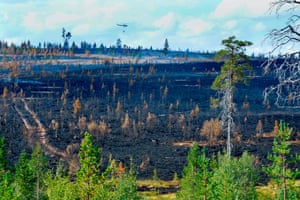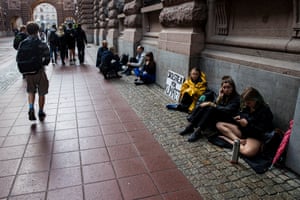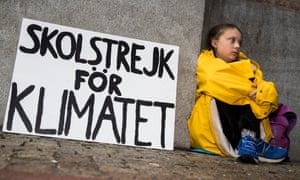Extract from The Guardian
Following Sweden’s hottest summer ever, Greta Thunberg decided to go
on school strike at the parliament to get politicians to act
Why bother to learn anything in school if politicians won’t pay attention to the facts?
This simple realisation prompted Greta Thunberg, 15, to protest in the most effective way she knew. She is on strike, refusing to go to school until Sweden’s general election on 9 September to draw attention to the climate crisis.
Her protest has captured the imagination of a country that has been struck by heatwaves and wildfires in its hottest summer since records began 262 years ago.
Every day for two weeks, Thunberg has been sitting quietly on the cobblestones outside parliament in central Stockholm, handing out leaflets that declare: “I am doing this because you adults are shitting on my future.”
Thunberg herself is a diminutive girl with pigtails and a fleeting smile – not the stereotypical leader of a climate revolution.
“I am doing this because nobody else is doing anything. It is my
moral responsibility to do what I can,” she says. “I want the
politicians to prioritise the climate question, focus on the climate and
treat it like a crisis.”
“I have my books here,” she says in flawless English. “But also I am thinking: what am I missing? What am I going to learn in school? Facts don’t matter any more, politicians aren’t listening to the scientists, so why should I learn?”
Thunberg’s protest might come as a surprise to anyone seduced by Sweden’s reputation as a climate pioneer and champion of the environment. This year the country enacted “the most ambitious climate law in the world”, aiming to become carbon neutral by 2045 and comfortably beating the 2015 Paris climate targets along the way.
“This is too little too late, it needs to come much faster,” Thunberg says. “Sweden is not a green paradise, it has one of the biggest carbon footprints.”
Her parents want her to give up her protest and go back to school. “My teachers are divided,” Thunberg says. “As people they think what I am doing is good, but as teachers they say I should stop.”
One teacher to have downed tools to join her protest is Benjamin Wagner, 26. He expects to lose three weeks’ wages – and his job – as a result of his strike.
“Our inability to stop climate change is like the efforts to stop world war one – we knew for years it was coming, they arranged all sorts of conferences, but still they didn’t prevent it,” Wagner says.

This simple realisation prompted Greta Thunberg, 15, to protest in the most effective way she knew. She is on strike, refusing to go to school until Sweden’s general election on 9 September to draw attention to the climate crisis.
Her protest has captured the imagination of a country that has been struck by heatwaves and wildfires in its hottest summer since records began 262 years ago.
Every day for two weeks, Thunberg has been sitting quietly on the cobblestones outside parliament in central Stockholm, handing out leaflets that declare: “I am doing this because you adults are shitting on my future.”
Thunberg herself is a diminutive girl with pigtails and a fleeting smile – not the stereotypical leader of a climate revolution.
“I have my books here,” she says in flawless English. “But also I am thinking: what am I missing? What am I going to learn in school? Facts don’t matter any more, politicians aren’t listening to the scientists, so why should I learn?”
Thunberg’s protest might come as a surprise to anyone seduced by Sweden’s reputation as a climate pioneer and champion of the environment. This year the country enacted “the most ambitious climate law in the world”, aiming to become carbon neutral by 2045 and comfortably beating the 2015 Paris climate targets along the way.
“This is too little too late, it needs to come much faster,” Thunberg says. “Sweden is not a green paradise, it has one of the biggest carbon footprints.”
Her parents want her to give up her protest and go back to school. “My teachers are divided,” Thunberg says. “As people they think what I am doing is good, but as teachers they say I should stop.”
One teacher to have downed tools to join her protest is Benjamin Wagner, 26. He expects to lose three weeks’ wages – and his job – as a result of his strike.
“Our inability to stop climate change is like the efforts to stop world war one – we knew for years it was coming, they arranged all sorts of conferences, but still they didn’t prevent it,” Wagner says.

“Greta is a troublemaker, she is not listening to adults. But we are heading full speed for a catastrophe, and in this situation the only reasonable thing is to be unreasonable.”
There are signs that more Swedes are listening. The Green party, a partner in the centre-left coalition government, was languishing in the polls before the country was hit by more than 60 forest fires, which raged for weeks through a rural tinderbox created by the unprecedented drought. Now the party’s support is up by half to about 6%.
“I am very impressed by Greta’s courage and determination,” says Janine Alm Ericson, a Green member of parliament.
“But I am also sad that she feels she has to be there – the political parties in Sweden have not done enough. Thanks to the hot summer it has become easier for people to imagine what climate change can mean for us and others in Europe if we continue to ignore what is happening.”
Outside parliament, Stella d’Ailly, 45, an art director, has come to join Thunberg’s protest.
“I feel like I am dying inside if I don’t protest,” she says. “Sweden may be well organised to recycle our trash, for example, but we do nothing to cut the amount of plastic bottles and packaging in the first place. We need drastic change.”
Thunberg’s own awakening to the climate crisis a few years ago caused upheaval in her family. Her mother, the well known opera singer Malena Ernman, has given up her international career because of the climate effects of aviation.
“Greta forced us to change our lives,” says her father Svante. “I didn’t have a clue about the climate. We started looking into it, reading all the books – she has read them too.”

Her teachers were telling her to turn off the lights and save paper, then flying off to New York for a holiday. For Greta, this was just not good enough: “Everyone believes that we can solve the crisis without effort, without sacrifice,” she wrote in an article widely circulated on social media and translated into English.
While on strike, she has done a lot of homework and read three books, her father says.
“She is supposed to be in school, we cannot support her action. But we respect that she wants to make a stand. She can either sit at home and be really unhappy, or protest and be happy.”
Greta has Asperger’s syndrome, which in the past has affected her health, he says. She sees her condition not as a disability but as a gift which has helped open her eyes to the climate crisis.
“The best thing about my protest has been to see how more and more people have been coming and getting involved,” Greta says.
“I don’t care if I get into trouble at school. I believe that one person can make a difference.”

No comments:
Post a Comment